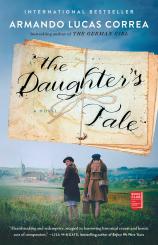Reading Group Guide
Discussion Questions
The Daughter's Tale

1. In the first scene, when Ida and Anna Rosen give Elise the box full of letters written by her mother so long ago, she calls this moment a “final act of forgetting” (p. 6). What do you think she means by that?
2. Near the end of Chapter 2, Amanda, Julius and Hilde watch in horror as the books from the shop are burned in public in the Nazis’ campaign to squash any ideology that is “offensive, unpatriotic, or not sufficiently German” (p, 13). Hilde and Julius both watch sadly, but Amanda’s face is “frozen in a strange smile” (p. 24). Are you surprised by her response? What does this reaction say about her character?
3. In Julius’ farewell letter to his wife, he implores her to “never forget that we were happy once” (p. 45). But in THE DAUGHTER'S TALE, moments of happiness are few and far between. Consider the ways in which the novel asks us to reconsider our notion of happiness. Do you think that the memory of happiness and the promise of a future happiness are enough for Amanda? Why or why not?
4. When Amanda is packing up her few belongings, she chooses to take along her ebony box, botanical album, Star of David necklaces, and the jewelry that she uses as a bargaining chip in Lina’s escape from the camp. Discuss each of these items. What significance do they hold? Trace how each item plays a part in the salvation of her daughters.
5. Revisit the scene when Amanda decides to send Viera alone onto the ship, entrusting her in the care of the then-stranger Frau Meyer. How do you feel about her last-minute decision?
6. “For Claire, the war was just beginning. For Amanda, it was coming to an end” (p. 105). Compare Claire Duval to Amanda Sternberg. Did your opinion of either of them change over the course of the novel? In your response, consider Claire’s relationship with Lina and her decision to sacrifice herself in the town square.
7. What compels Amanda to write letters to Viera that might never reach her? She describes the act as a “pointless farce” but still “the words spilled out furiously, unrelenting” (p. 107).
8. Consider the role of grief in the novel. Does the lack of freedom, both inside and outside the camp, prevent the characters from being able to properly grieve? What about after the war, for those who survive? Is there any room for grief? Consider Amanda, Danielle, Lina, Berenice and Marie-Louise in your response.
9. Revisit the scene on page 153 when Amanda slices her hand cutting potatoes. She sees the blood rushing out of her hand and “she smiled: she was still alive” (p. 153). What does this reaction say about the current state of her psyche? And how does it relate to the smile discussed in question 2?
10. The moment Amanda stabs Bertrand is shocking, in part because up until that moment she had seemed incapable of such violence. What drove Amanda to murder him? What does she lose, or gain, in this fatal act?
11. “They had lost all sense of time,” (p. 192) the narrator proclaims, after Danielle and Elise survive the bombing in the town square. In a literal sense, the trauma of the moment affects their sense of the hour of the day, but in a broader sense, the trauma of war renders time meaningless. Discuss what Marie-Louise means when she says “time is against us” (p. 219).
12. When the children discover the dying German soldier held captive inside the abbey, they are shocked. Danielle later thinks, “She had witnessed a crime, and that made her as guilty as the criminal or more, because she had said nothing” (p. 233). Do you agree or disagree with Danielle? How does this scene speak to the question of culpability explored in the novel?
13. Discuss the significance of the title. To which daughter does the title refer? Why wasn’t it called Lina’s Tale or Viera’s Tale or Amanda’s Tale, or even Elise’s Tale?
The Daughter's Tale
- Publication Date: January 7, 2020
- Genres: Fiction, Historical Fiction
- Paperback: 336 pages
- Publisher: Washington Square Press
- ISBN-10: 1501187945
- ISBN-13: 9781501187940







